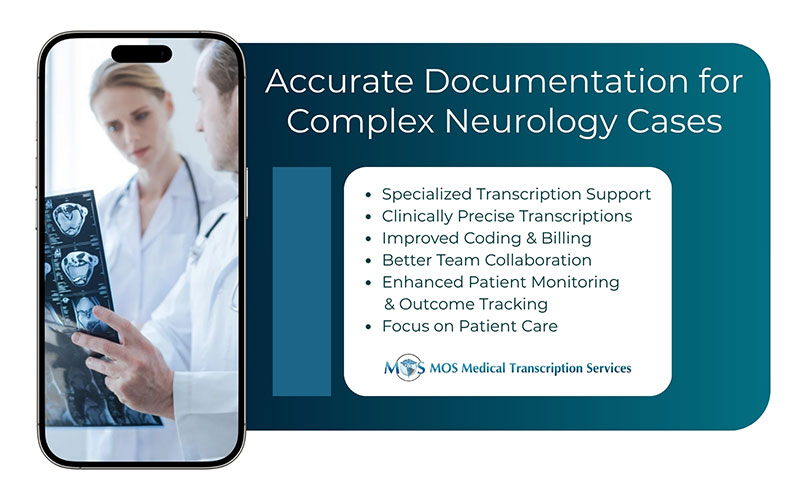
Table of Contents
Accurate and timely documentation is the cornerstone of effective medical practice. This is especially true in the field of neurology, where even minor misinterpretations can have serious implications for diagnosis and treatment. The demand for neurological transcription accuracy has never been greater. Neurologists must capture complex clinical interactions, specialized exam findings, and highly technical terminology without compromising on accuracy. To meet this growing demand, many neurologists are turning to medical transcription services to streamline workflows and ensure precision in patient records.
The Rising Demand for Accurate Neurological Documentation
Neurology is a complex specialty that requires documentation of detailed patient histories, advanced physical exams, and multifaceted assessments. From cranial nerve evaluations to motor function tests, every consultation generates a large amount of sensitive and technical data. Unlike many other fields of medicine, neurology frequently involves interdisciplinary collaboration with oncologists, psychiatrists, and surgeons, making clarity and precision in documentation vital. Additionally, neurology research often involves complex data from EEGs, MRIs, and patient histories, and precise transcription ensures that this data is documented clearly and can be reliably analyzed.
Outsourced transcription services offer neurologists the support they need to record and maintain highly accurate, detailed reports—without sacrificing valuable time with patients.
The Complexity of Neurological Reporting
Clinical documentation in neurology involves much more than simply recording symptoms and diagnoses. Neurologists must frequently document a wide array of specialized tests, such as EEG interpretations, EMG results, and evaluations for conditions like epilepsy, Parkinson’s disease, and neuropathies. Furthermore, terminologies such as “generalized tonic-clonic seizure” or “upper motor neuron lesion” must be transcribed with 100% precision.
This need for precision presents unique challenges in transcribing neurology reports. Unlike general practice documentation, neurology demands deep familiarity with technical language and concepts. A simple transcription error could not only delay treatment but also jeopardize compliance and billing accuracy.
Streamlining Neurology Clinic Workflow with Transcription Support
Administrative burdens are a major source of stress for neurologists. Transcribing reports immediately after patient visits can consume hours of a physician’s day and drastically reduce the number of patients seen. In busy practices, this can mean working long hours into the evening to finish clinical notes.
Utilizing specialized medical transcription services reduces that burden significantly. By outsourcing transcription to professionals trained in neurological terminology, physicians can shift their focus from clerical work to direct patient care. This not only improves productivity but also enhances physician satisfaction.
Additionally, by partnering with transcription providers offering integration with Electronic Health Records (EHRs), neurologists can enhance neurology clinic workflow and access completed records quickly through secure digital platforms.
Accurate Documentation to Support Complex Cases
Each subfield within neurology, whether it’s epilepsy, pediatric neurology, or neurosurgery, has its own documentation style and terminology. A generic transcription approach simply won’t cut it. That’s where transcription support for complex neurological cases becomes critical.
Expert transcriptionists familiar with the nuances of each subspecialty can ensure that medical notes are not only grammatically correct but also clinically precise. This allows for accurate coding, billing, and interdepartmental collaboration-especially when dealing with high-stakes cases involving seizures, strokes, or neurodegenerative conditions.
Moreover, this kind of skilled transcription enables better monitoring of patient outcomes, easier data retrieval, and smoother communication among care teams.
In neurology, where the margin for error is slim, and documentation complexity is high, medical transcription services play a vital role in maintaining precision and efficiency. With the support of specialized transcriptionists, neurologists can focus on patient care while ensuring that their clinical notes meet the highest standards of accuracy, compliance, and usability.
As digital transformation continues to reshape the healthcare landscape, investing in reliable transcription services is more than just a time-saver-it’s a necessity for excellence in neurological care.

